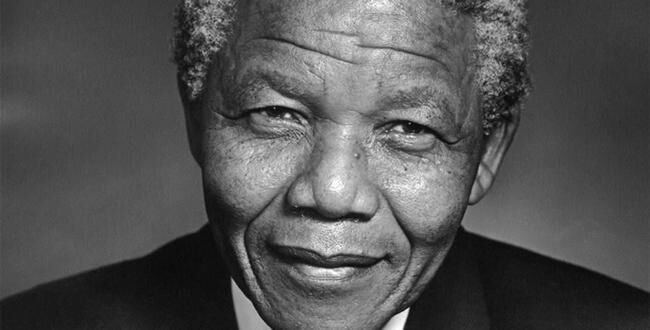Nelson Mandela is a non-violent anti-apartheid activist and politician from South Africa.
A lawyer by profession, he worked for the African National Congress (ANC), the political party representing black africans, to combat the over-representation of white people in congress and the apartheid laws introduced by the National Party in 1948. Since the peaceful struggle, influenced by Gandhi, produced no results, he decided to create a military branch of the ANC. However, while the organization embarked on a campaign of sabotage, Mandela advocated actions that did not endanger human life. In all, one hundred and ninety armed attacks took place, leading the United States and the United Kingdom to declare Nelson Mandela a terrorist. Both countries denied him residency. Two years later, with the help of the CIA, Mandela was arrested and imprisoned.
During his incarceration, he became a symbol of the struggle against racial segregation, and won growing international support. As soon as he was released from prison, he entered into dialogue and negotiation with the government in power, with the aim of making South Africa a more democratic country and freeing it from the apartheid regime. Four years later, he became President of the Republic of South Africa in the first multiracial national elections. He then worked tirelessly to reconcile the Black and White populations, with the help of the country's rugby team, among others. At the end of his mandate, he left politics to devote himself to the fight against poverty, AIDS, the treatment of disabled people and economic inequality. He is renowned for his ability to forgive, his leadership and his integrity. But above all, he is a world reference in the defense of human rights and freedoms.
-
1918: Nelson Mandela is born on July 18, in South Africa.
-
1950: The South African government creates the Supression Communist Act, which declares a communist anyone who “seeks to bring about political, industrial, economic or social change by unlawful means”.
-
1952: Ten thousand people demonstrate on the three-hundredth anniversary of the arrival of whites in South Africa. Eight thousand five hundred of them are arrested, including Mandela.
-
1960: The ANC takes part in the peaceful Sharpeville demonstration to denounce the compulsory internal passport for blacks and women. Police open fire on the demonstrators, killing sixty-nine and wounding one hundred and eighty. Several demonstrations followed, leading the government to declare a state of emergency and ban the ANC from meeting. The United Nations calls on the South African government to end its segregationist policies.
-
1961: Following the events of 1960, and seeing that non-violent action had no effect on the government, Mandela founded and led the ANC's military wing.
-
1962: He is arrested by the police on August 5 and sentenced to prison and hard labor for life. During his incarceration, he and his companions exchange knowledge, creating a small learning community. Mandela taught them politics and literature, including William Ernest Henley's poem Invictus (Undefeated). In return, he learns the history and language of the Afrikaners, the non-English-speaking white South Africans.
-
1971: The United Nations declares apartheid a crime against humanity.
-
1990: After 27 years in prison, Nelson Mandela is released on February 11. He works to reconcile the nations of South Africa by negotiating with the government president, Frederik de Klerk.
-
1993: He receives the Nobel Peace Prize, jointly with Frederik de Klerk.
-
1994: Narrowly avoiding civil war between apartheid, ANC and Inkhata supporters, Mandela becomes President of the Republic of South Africa on April 27.
-
2008: George W. Bush removes ANC members, including Mandela, from the US blacklist. The former President of South Africa can therefore once again visit the country without a warrant.
-
2013: Nelson Mandela dies on December 5, in Johannesburg.
